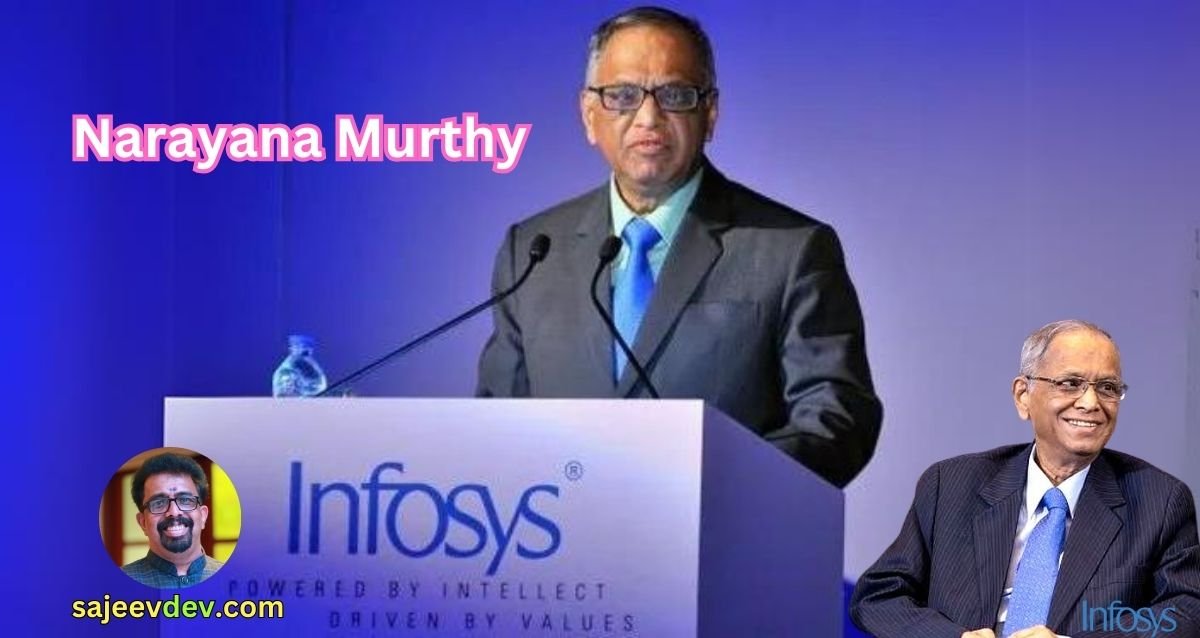Early Life and Education
N. R. Narayana Murthy, an iconic figure in India’s IT industry, was born on August 20, 1946, in Sidlaghatta, Karnataka, to a middle-class family. His upbringing was steeped in an environment that valued education, instilling in him a lifelong commitment to learning and excellence. This commitment was evident from an early age, as he demonstrated an innate curiosity and drive to excel in his studies.
Murthy’s formal education began in Karnataka, where he pursued his initial schooling. His academic prowess and determination led him to the National Institute of Engineering in Mysuru, where he completed his bachelor’s degree in Electrical Engineering. His time at the institute was marked by a deep engagement with the intricacies of engineering, providing him with a solid foundation in this field.
In pursuit of further academic excellence, Murthy joined the prestigious Indian Institute of Technology (IIT) Kanpur, one of India’s premier technical institutes. Here, he earned his Master of Technology (MTech) degree in 1969. The rigorous curriculum at IIT Kanpur, combined with an enriching academic environment, equipped him with advanced technical skills and a robust understanding of computer science and engineering. These skills would later prove invaluable in his career as a pioneering entrepreneur and technology visionary.
Murthy’s academic journey is a testament to his dedication and commitment to learning. The strong educational background he acquired not only enhanced his technical expertise but also shaped his analytical and problem-solving capabilities. These attributes would become cornerstones of his approach to business and innovation, laying the groundwork for his future contributions to the Indian information technology sector.
Career Beginnings and Entrepreneurial Journey
N. R. Narayana Murthy’s illustrious professional journey commenced as the Chief Systems Programmer at the Indian Institute of Management Ahmedabad. In this pivotal role, he was instrumental in the development of India’s first time-sharing computer system, a groundbreaking advancement at the time. This early experience not only honed his technical skills but also instilled in him a profound understanding of information technology’s transformative potential.
Further bolstering his expertise, Murthy contributed significantly to the Electronics Corporation of India Limited by designing a basic interpreter. These early accomplishments underscored his technical prowess and innovative mindset, laying a solid foundation for his subsequent entrepreneurial ventures.
Despite facing an early entrepreneurial setback with a company named Softronics, Murthy’s resilience and vision remained undeterred. In 1981, he took a leap of faith and co-founded Infosys alongside six other software professionals. The initial investment of Rs 10,000, provided by his wife Sudha Murty, marked the humble beginnings of what would eventually become a global IT giant.
As the CEO of Infosys from 1981 to 2002, Murthy’s leadership was instrumental in the company’s evolution from a modest startup into an international powerhouse in the IT services sector. His strategic vision and unwavering dedication were crucial in navigating the company through various market challenges and technological shifts, enhancing its reputation as a reliable and innovative service provider.
Under Murthy’s stewardship, Infosys not only achieved remarkable financial growth but also set high standards for corporate governance and ethical business practices. His leadership philosophy, centered on meritocracy, transparency, and continuous learning, has left an indelible mark on the corporate landscape, both in India and globally.
Building Infosys and Pioneering Outsourcing
N. R. Narayana Murthy, an iconic figure in India’s IT sector, founded Infosys in 1981 with a vision grounded in principles of ethics, transparency, and innovation. From its inception, Infosys was determined to set new standards within the computing industry, distinguishing itself through integrity and operational excellence. Murthy’s leadership was instrumental in steering Infosys towards becoming a global powerhouse, particularly in the realm of IT services outsourcing.
One of Murthy’s most transformative contributions was the introduction of the Global Delivery Model (GDM). This innovative model leveraged India’s highly educated and skilled workforce, allowing Infosys to deliver high-quality services to clients worldwide at competitive costs. The GDM became a game-changer for the IT industry, enabling seamless collaboration across global geographies and ensuring uninterrupted service delivery.
In 1999, Infosys achieved a landmark milestone by becoming the first Indian company to be listed on the NASDAQ stock exchange. This not only marked a significant achievement for Infosys but also symbolized the arrival of Indian IT companies on the global stage. The NASDAQ listing amplified Infosys’ reputation, boosting investor confidence and enhancing its ability to attract international clients and talent.
Under Murthy’s stewardship, Infosys cultivated a corporate culture that prioritized merit, innovation, and ethical practices. This merit-based approach ensured that talent and performance were the primary drivers of growth and career advancement within the company. By fostering an environment of fairness and integrity, Infosys differentiated itself from many competitors who were often plagued by bureaucratic inertia and opaque practices.
Through his unwavering commitment to ethical business practices and innovation, N. R. Narayana Murthy not only shaped Infosys into a global leader but also laid a robust foundation for India’s burgeoning IT industry. His pioneering efforts in outsourcing have had a lasting impact, setting benchmarks for transparency and excellence that continue to inspire the sector today.
Leadership Transition and Continued Involvement
N. R. Narayana Murthy’s journey with Infosys is marked by several key leadership transitions that reflect his unwavering commitment to the company. After steering Infosys from its inception in 1981 to becoming a global IT powerhouse, Murthy stepped down as CEO in 2002. His role, however, didn’t diminish with this transition; he took on the position of Chairman, continuing to guide Infosys with his visionary insights. Under his chairmanship until 2011, the company reached new heights in innovation and financial performance, further cementing its status as a leader in the IT sector.
In recognition of his invaluable contributions, Murthy was honored with the title of Chairman Emeritus in 2011. This role allowed him to remain involved in a mentorship capacity, offering strategic advice and fostering a culture of ethical practices and excellence that had become synonymous with Infosys. His guidance played an instrumental role in maintaining the company’s foundational values of integrity and transparency.
The landscape of the IT industry is constantly evolving, often presenting challenges that require strong leadership to navigate. In 2013, Infosys faced such a period of difficulty. Demonstrating his deep commitment to the company, Murthy returned as Executive Chairman to help stabilize operations and restore investor confidence. His return was met with widespread approval, and through his leadership, Infosys was able to streamline its strategies and reinforce its market position.
N. R. Narayana Murthy’s tenure at Infosys is not just a chronicle of roles and titles; it is a testament to his exceptional leadership and business acumen. His ability to adapt to various leadership challenges and his ongoing involvement with Infosys have solidified his reputation as an ethical leader par excellence, inspiring not just his organisation but the wider business community. His legacy continues to underscore the importance of visionary leadership in achieving sustainable growth and ethical business practices.
Legacy and Recognition
N. R. Narayana Murthy’s monumental contributions to the field of information technology have not only transformed India’s IT landscape but have also earned him a series of prestigious accolades, both nationally and internationally. Among his notable recognitions, Murthy has been honored with the Padma Shri and the Padma Vibhushan, two of the highest civilian awards in India. These awards highlight his significant impact on India’s economic growth and technological advancement.
Beyond national borders, Murthy’s influence extends internationally. He has been bestowed with the Order of the British Empire (CBE) and the Legion of Honour, France’s highest civilian award. These international accolades reflect Murthy’s global stature and the universal respect he commands for his contributions to technology and business.
In addition to these honors, Fortune magazine notably listed Murthy among the ’12 Greatest Entrepreneurs of Our Time’. This listing underscores his exceptional entrepreneurial vision and his role in shaping the modern IT services industry. Under his leadership, Infosys grew from a modest start-up into a global behemoth, setting new standards for corporate governance, innovation, and sustainability.
Murthy’s role extends beyond his achievements with Infosys. He has served on various corporate and educational boards, offering his expertise and vision to a broader array of institutions. His philanthropic initiatives are also noteworthy; through the Infosys Foundation and his personal contributions, he has significantly impacted education, healthcare, and rural development programs across India. These endeavors have further cemented his legacy as a transformative leader and a compassionate visionary.
Overall, N. R. Narayana Murthy’s diverse recognitions and his far-reaching influence underscore a legacy that goes beyond corporate success. His commitment to ethical business practices, innovation, and social responsibility stands as a testament to his visionary leadership and enduring impact on both national and international stages.
Philosophy and Impact
N. R. Narayana Murthy’s philosophy, aptly termed ‘Compassionate Capitalism,’ represents a distinct and transformative approach to business. Advocating for wealth creation through ethical means, Murthy believes that business and capitalism can serve as potent tools for societal benefit. His journey towards this philosophy stemmed from personal evolution; once a self-proclaimed ‘confused leftist/communist,’ Murthy’s outlook was profoundly altered by a pivotal experience in Eastern Europe in 1974. Witnessing firsthand the implications of restrictive ideologies led him to embrace the principles of ethical capitalism.
Murthy’s commitment to this ethos transcends mere rhetoric. His advocacy for corporate governance and ethical leadership has set a benchmark not only in India but globally. Establishing robust frameworks within Infosys, the company he co-founded, Murthy emphasized transparency, accountability, and integrity. These principles were embedded into the corporate fabric, fostering an environment where ethical practices were paramount. This focus on high standards of governance attracted global recognition and helped build investor trust, enhancing Infosys’ reputation and performance.
The impact of Murthy’s compassionate capitalism is evidenced by the successful amalgamation of profitability with social responsibility. Infosys’ significant contributions to community programs, education, and environmental sustainability underscore this commitment. By integrating ethical considerations into the core business strategy, Murthy has demonstrated that it is possible to achieve financial success while uplifting society. Consequently, his philosophy has influenced a new generation of business leaders and entrepreneurs worldwide, advocating a balanced approach that values both profit and purpose.
In sum, N. R. Narayana Murthy’s vision extends beyond his significant contributions to India’s IT sector. His philosophy of compassionate capitalism has profoundly impacted corporate governance and ethical leadership, inspiring a global movement towards responsible business practices.
Beyond Infosys: Board Memberships and Philanthropy
N. R. Narayana Murthy has significantly extended his influence beyond Infosys, leveraging his expertise to contribute to various prestigious organizations. Notably, he has served on the board of the United Nations Foundation and the Ford Foundation, among others. His involvement with these entities underscores his dedication to global development and his ability to impact policy and strategic direction on an international scale.
In addition to his board memberships, Murthy is renowned for his philanthropic endeavors. He and his family have consistently supported numerous educational and healthcare initiatives across India. Through the Infosys Foundation, co-founded by his wife Sudha Murty, significant resources have been allocated to improve education and healthcare in underserved communities. The foundation’s work has helped bridge gaps in these critical sectors, providing opportunities for countless individuals who might otherwise be left behind.
Murthy’s commitment to educational advancement is further exemplified by his involvement with institutes of higher learning. He has played a pivotal role in shaping the future of education in India by being actively engaged with premier institutions like the Indian Institute of Management (IIM) and the Indian School of Business (ISB). His contributions have been instrumental in nurturing future leaders and fostering an environment of innovation and excellence.
Moreover, his advocacy for strong corporate governance resonates through his professional and philanthropic work. Murthy firmly believes in transparency, accountability, and ethical practices within organizations. This philosophy has had a lasting impact on modern business practices, influencing how companies operate and aspire to uphold integrity in all their endeavors.
Overall, N. R. Narayana Murthy’s contributions extend far beyond his pioneering efforts at Infosys. Through his board memberships, philanthropy, and commitment to educational and corporate governance, he continues to shape the landscape of business and society, serving as an enduring inspiration for future generations.
N. R. Narayana Murthy’s journey from a modest town in Karnataka to a globally recognized icon
N. R. Narayana Murthy’s journey from a modest town in Karnataka to a globally recognized icon is a testament to his vision, perseverance, and ethical leadership. His pivotal contributions to the IT industry have not only transformed Infosys into an IT giant but also significantly impacted India’s economic landscape, establishing the country as a global technology leader.
Murthy’s emphasis on innovation, quality, and customer satisfaction propelled Infosys to the forefront of the global IT services sector. His strategic foresight enabled the creation of a corporate environment that prioritized transparency, corporate governance, and employee empowerment, paving the way for countless tech entrepreneurs to follow suit. In a broader sense, Murthy’s vision has played a crucial role in redefining India’s brand as a technology hub, encouraging global businesses to consider India a viable and competitive destination for IT solutions.
Furthermore, Murthy’s legacy extends beyond strategic business success to a deeply ingrained ethical foundation. His approach to leadership, which combines business acumen with uncompromising integrity, offers a valuable blueprint for building sustainable and ethically-driven enterprises. This philosophy has resonated across the industry, instilling a sense of purpose and responsibility among IT professionals and leaders alike.
As we reflect on N. R. Narayana Murthy’s exceptional journey, it is clear that his relentless pursuit of excellence and commitment to ethical practices have left an indelible mark on the global IT landscape. His story continues to serve as a beacon of inspiration, illuminating the path for future generations of innovators and business leaders. N. R. Narayana Murthy’s invaluable contributions offer profound insights into the creation of impactful and enduring enterprises, ensuring his legacy will inspire and instruct for years to come.









